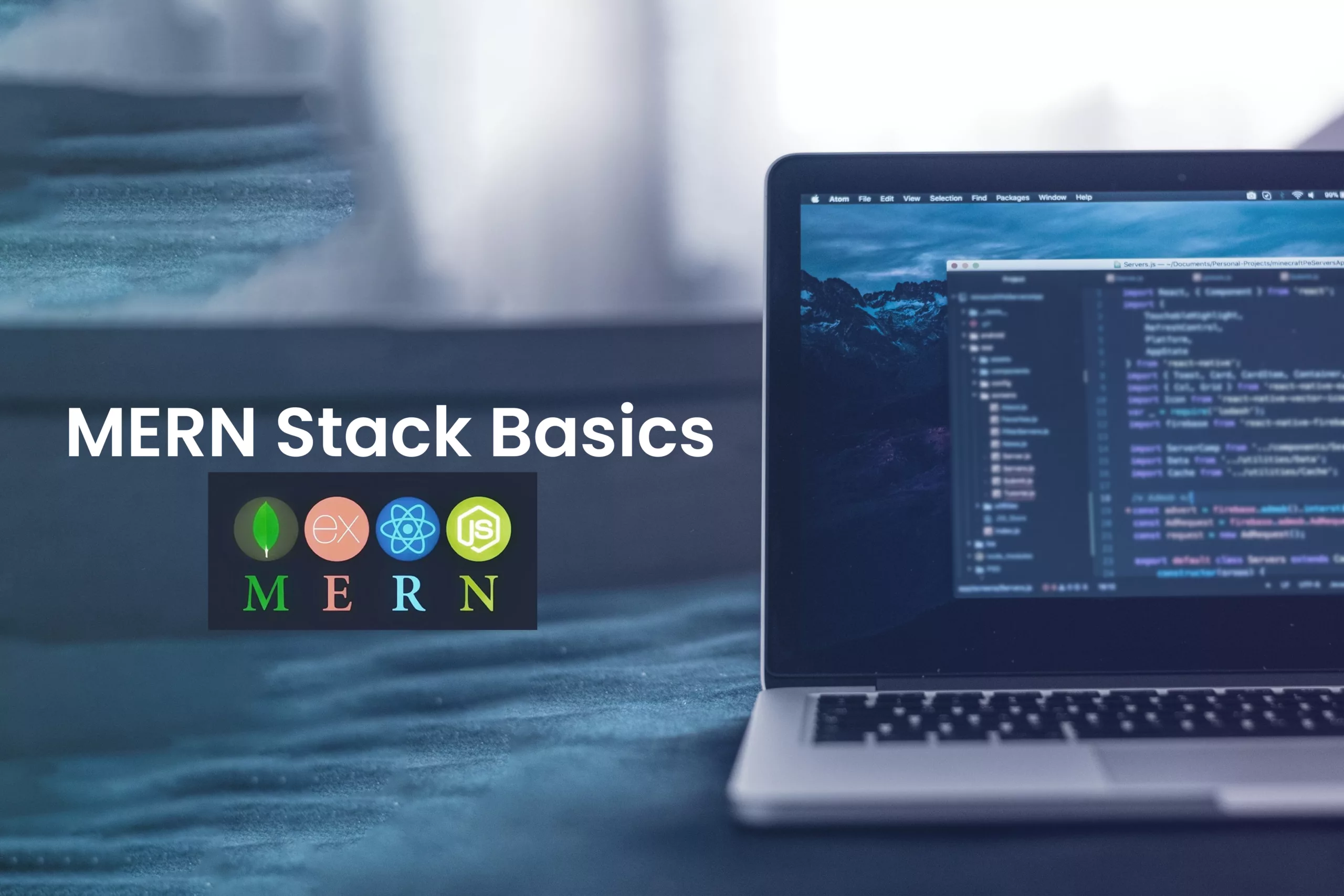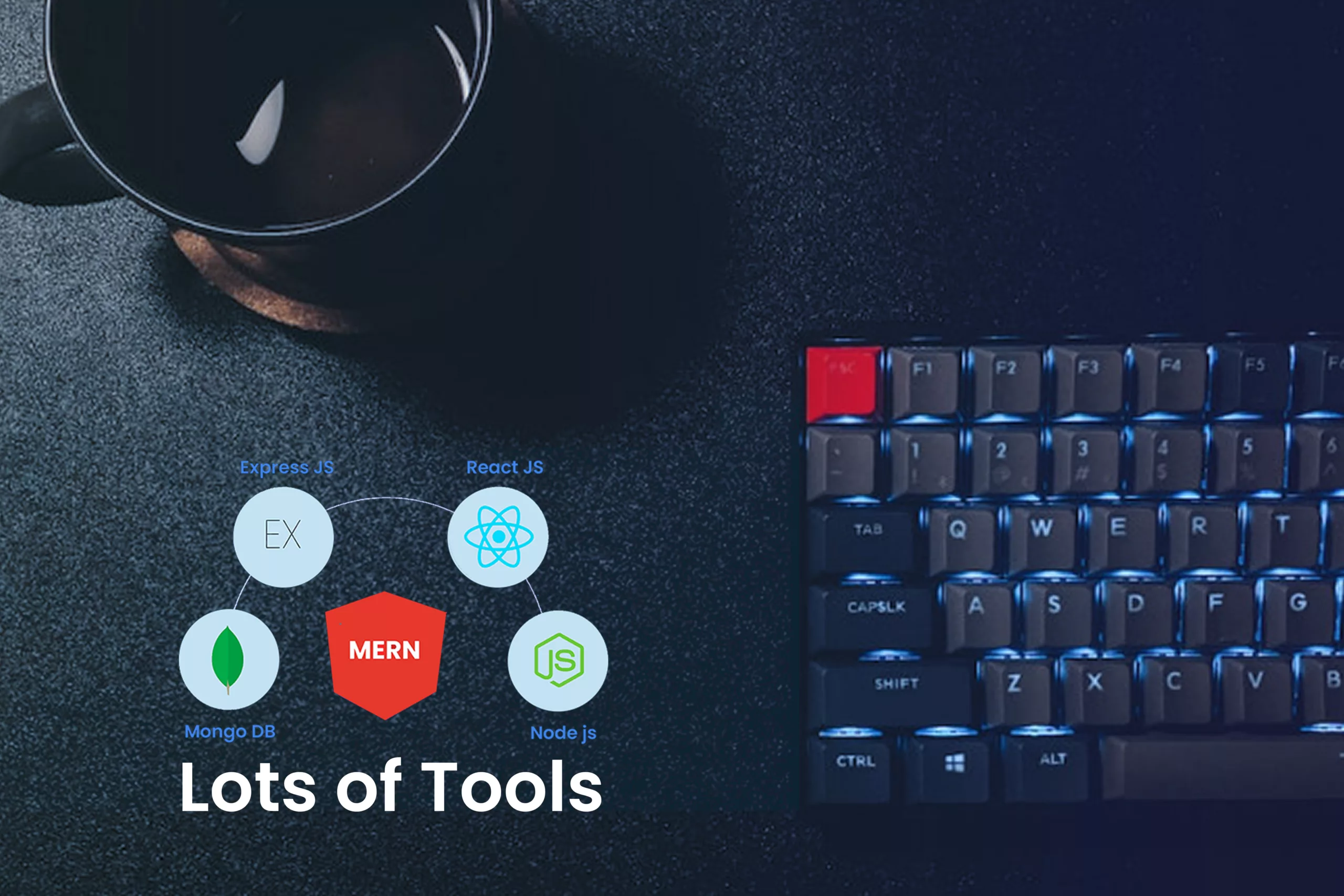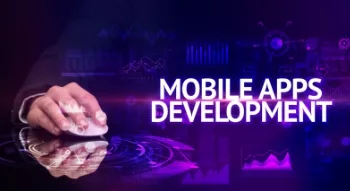62% of today’s modern businesses have an app or are considering building one since it helps in business expansion. If you are one of them, you might have been recommended to build your app with the MERN stack.
But what is the MERN stack, and why should you hire MERN developers to build your app using it? In this article, we’ll explain the MERN stack and share the exclusive advantages that make it highly popular and the most recommended for building your app.
Read till the end to discover the perks MERN comes with.
Understanding the MERN Stack Basics

The MERN Stack is a powerful and popular technology stack. It is used for building modern web applications. The acronym MERN stands for MongoDB, Express.js, React, and Node.js, representing a full-stack JavaScript framework. Each of its components plays a distinct role in the development process, allowing you to seamlessly create feature-rich and scalable applications.
MongoDB
MongoDB is the database layer in the MERN Stack. It is a NoSQL database that stores your data in a flexible, JSON-like format known as BSON. MongoDB’s schema-less design provides you with the freedom to adapt and modify your data structure without the constraints of a rigid schema. This flexibility is particularly advantageous for projects with evolving data requirements.
Express.js
Express.js is a minimal and flexible backend web application framework for Node.js. It simplifies the process of building robust and scalable server-side applications by providing a set of features and tools. Express.js facilitates the handling of HTTP requests, routing, middleware configuration, and more, offering developers a streamlined and efficient environment for backend development.
React
React is a declarative and component-based JavaScript library for building user interfaces. As the frontend component of the MERN Stack, React enables you to create modular and reusable UI components. Its virtual DOM (Document Object Model) ensures efficient updates and rendering, contributing to a smooth and responsive user experience. React is widely adopted for its simplicity and the ease with which it integrates with other technologies.
Node.js
Node.js is a runtime environment that allows JavaScript to be executed on the server side. It is designed with an event-driven, non-blocking I/O model, making it highly efficient for handling concurrent connections. Node.js is integral to the MERN Stack as it enables you to use JavaScript throughout the entire application stack, fostering a consistent and unified development experience.
10 Exceptional Advantages of MERN Stack for Modern Apps
Use One Language

The “Use One Language” advantage is a foundational feature within the MERN Stack. It simplifies your development process. JavaScript is the universal language for both the front end (React) and the back end (Node.js), ensuring a consistent and streamlined coding experience. This linguistic unity keeps you from juggling with multiple programming languages, resulting in a cohesive and coherent codebase.
Beyond promoting consistency, this approach encourages code reusability, allowing you to seamlessly apply components across the entire application. The development team gains full-stack proficiency, empowering them with a holistic understanding of your application architecture. This, in turn, facilitates more effective troubleshooting and debugging. So, hire MERN developers to navigate seamlessly between frontend and backend tasks.
Moreover, using a single language fosters a unified development environment, enabling your team to leverage a shared set of tools and best practices. This not only enhances collaboration but also simplifies deployment processes and encourages efficient communication among team members.
Lots of Tools

MERN Stack highlights the extensive and diverse tools available for each stack component. It fosters a robust development environment. MongoDB, the database component, provides tools like MongoDB Compass for efficient data management. Express.js, the backend framework, offers middleware options like Morgan and Helmet, contributing to enhanced functionality and security.
React, the frontend library, brings a wealth of tools like Redux and React Router, facilitating the creation of modular and scalable user interfaces. Node.js, the runtime environment, boasts an extensive npm ecosystem, enabling you to leverage pre-built modules and tools for diverse server-side tasks.
In addition to component-specific tools, hire MERN developers to leverage its integrated development environments (IDEs). This abundance of tools not only accelerates development but also provides you with the flexibility to choose the best-suited tools for your specific needs. It creates a dynamic and productive ecosystem, empowering development teams to build scalable, feature-rich, high-performance applications.
Flexible and Scalable

MongoDB, the NoSQL database, stands out with its flexible schema, allowing you to adjust your data structures on the fly without the constraints of a fixed schema. This flexibility is particularly beneficial for applications with evolving data requirements, enabling seamless modifications without disrupting the entire database architecture.
Express.js provides a minimalistic yet powerful framework for backend development that allows you to structure applications based on specific project needs. This adaptability proves essential when building diverse applications with varying architectural demands. The combination of MongoDB and Express.js ensures that the backend of MERN applications remains agile and responsive to changing business needs.
Furthermore, the MERN Stack is designed for scalability. MongoDB’s horizontal scaling capabilities, coupled with the asynchronous nature of Node.js, make it well-suited for handling a growing number of users and data. This scalability ensures that MERN applications can effectively accommodate increasing workloads, making them a reliable choice for projects with dynamic and expanding user bases.
Real-time Features

Thanks to Node.js, MERN facilitates real-time communication in your applications. Node.js, as the runtime environment for server-side JavaScript execution, employs an event-driven, non-blocking I/O model. This makes it particularly adept at handling concurrent connections and enabling real-time interactions between clients and servers.
One key application of real-time features is in chat applications, where instant communication is crucial. Node.js, coupled with frameworks like Socket.IO, allows you to establish persistent connections between the server and clients, facilitating real-time bidirectional communication. This architecture is fundamental for creating responsive and interactive chat interfaces where you can send and receive messages instantly.
With Node.js facilitating real-time updates and changes, multiple users can seamlessly collaborate on documents or projects. It allows each participant to see updates in real-time without manual refreshing. So, hire MERN developers to make real-time features available and enhance user satisfaction.
Reuse Parts with React
React’s component-based approach allows you to break down the user interface into smaller, self-contained components. Each component encapsulates specific functionality and styling, promoting code reusability across different parts of the application. This streamlines your development process, enhances maintainability, and reduces redundancy.
For example, you can create a reusable component for a navigation bar and use it across various application pages. If modifications or improvements are needed, they can be made in a single place, and the changes will automatically propagate throughout your application wherever the component is used.
Moreover, React’s ability to manage states and props facilitates the creation of dynamic and flexible components. You can customize and extend these components based on the specific requirements of different sections of your application, ensuring a consistent yet adaptable user interface.
Fast Development with Express.js
Express.js in the MERN stack is a minimalist and flexible Node.js web application framework that simplifies creating server-side applications. One of its key features is its unobtrusive nature, allowing you to structure your applications based on individual project needs rather than imposing a rigid framework.
Express.js provides a set of essential features and middleware, streamlining common tasks such as routing, handling HTTP requests and responses, and managing middleware functions. Its simplicity and focus on modularity enable developers to quickly set up and prototype backend services, making it an ideal choice for rapid development cycles.
The framework’s extensive ecosystem of middleware and plugins further accelerates your development. It provides pre-built solutions for common functionalities, like authentication, logging, and error handling. You can easily integrate these components into their Express.js applications, saving time and effort in implementing these features from scratch.
Additionally, Express.js supports asynchronous programming, aligning well with the non-blocking nature of Node.js. This allows you to handle concurrent requests efficiently, enhancing the overall performance of your application.
Cross-functional Teams

MERN, consisting of MongoDB, Express.js, React, and Node.js, employs JavaScript across the entire stack. This unified language choice enables developers to work seamlessly on the frontend and backend aspects of your project. As a result, cross-functional teams, comprised of individuals with expertise in various domains, can easily collaborate on different layers of your application without the barrier of language silos.
For instance, frontend developers proficient in React can work alongside backend developers skilled in Node.js, ensuring a more integrated and cohesive development process. This collaborative approach breaks down traditional organizational silos, allowing team members to share insights, contribute to multiple facets of the project, and collectively address challenges.
The MERN Stack’s use of JavaScript as a common language facilitates effective communication and collaboration between team members specializing in front-end development, back-end development, and database management. This cohesiveness enhances the overall agility of your development team, as individuals can understand and contribute to different aspects of your application’s architecture.
Robust Community Support
Each component of MERN—MongoDB, Express.js, React, and Node.js— boasts an active and engaged community that provides you with a wealth of resources. From active forums like Stack Overflow to dedicated community spaces, you can seek advice, share insights, and troubleshoot issues collaboratively.
Extensive and well-documented resources further characterize the MERN community. Thorough documentation for each stack component eases the learning curve, and the open-source nature of these technologies encourages a continuous flow of improvements driven by a global community of contributors. Online courses, webinars, and conferences organized by the community offer structured learning paths and networking opportunities, enhancing skill development and fostering a sense of camaraderie among developers.
Moreover, the abundance of third-party libraries, packages, and support from tech companies backing MERN technologies demonstrate the collective strength of the community. This collaborative and supportive environment not only accelerates individual growth of hire MERN developers but also ensures that the MERN Stack remains at the forefront of modern web development.
Easy to Learn

Since MERN offers a unified language choice, it simplifies your learning curve. It provides a seamless transition between frontend and backend development.
JavaScript is one of the most used programming languages, and its popularity extends across web development, making it a common skill among developers. As a result, those familiar with JavaScript find it easy to grasp the MERN Stack, as they can leverage their existing knowledge when working on both frontend and backend aspects of a project.
React, the frontend library in the MERN Stack, adopts a declarative and component-based paradigm. This is intuitive for developers and facilitates straightforward understanding and implementation. Additionally, Node.js follows JavaScript’s asynchronous nature, aligning with the language’s principles and making it easier for you to adapt to server-side programming.
Strong Performance
Derived from the collective efficiency of its components, MERN is well-suited for building high-performance web applications. Node.js, serving as the runtime environment, employs an event-driven, non-blocking architecture, allowing it to handle multiple connections simultaneously and deliver rapid response times. React contributes to strong frontend performance through its virtual DOM, optimizing rendering processes and ensuring a responsive user interface.
On the backend, Express.js efficiently manages HTTP requests and responses, contributing to a streamlined server performance. MongoDB, as the NoSQL database, enhances data retrieval speeds through efficient indexing and caching mechanisms. The stack’s reliance on JSON for data interchange ensures lightweight and fast data transfer between frontend and backend components.
Furthermore, the MERN Stack allows for the incorporation of caching mechanisms and Content Delivery Networks (CDNs), optimizing the delivery of static assets and minimizing server load. This comprehensive approach to performance optimization makes the MERN Stack a powerful choice for developing web applications that demand speed, responsiveness, and scalability, meeting the expectations of today’s dynamic user experiences.
Hire MERN Developers to Build World-Class Applications
Want to hire MERN developers so you can leverage all the advantages above? Get in touch with VinnCorp to discuss your requirements.
We are a remote talent company that provides MERN developers with a proven track record. Our developers take the time to understand your requirements and leave no stone unturned to exceed your expectations.
Contact us today to discuss further.



